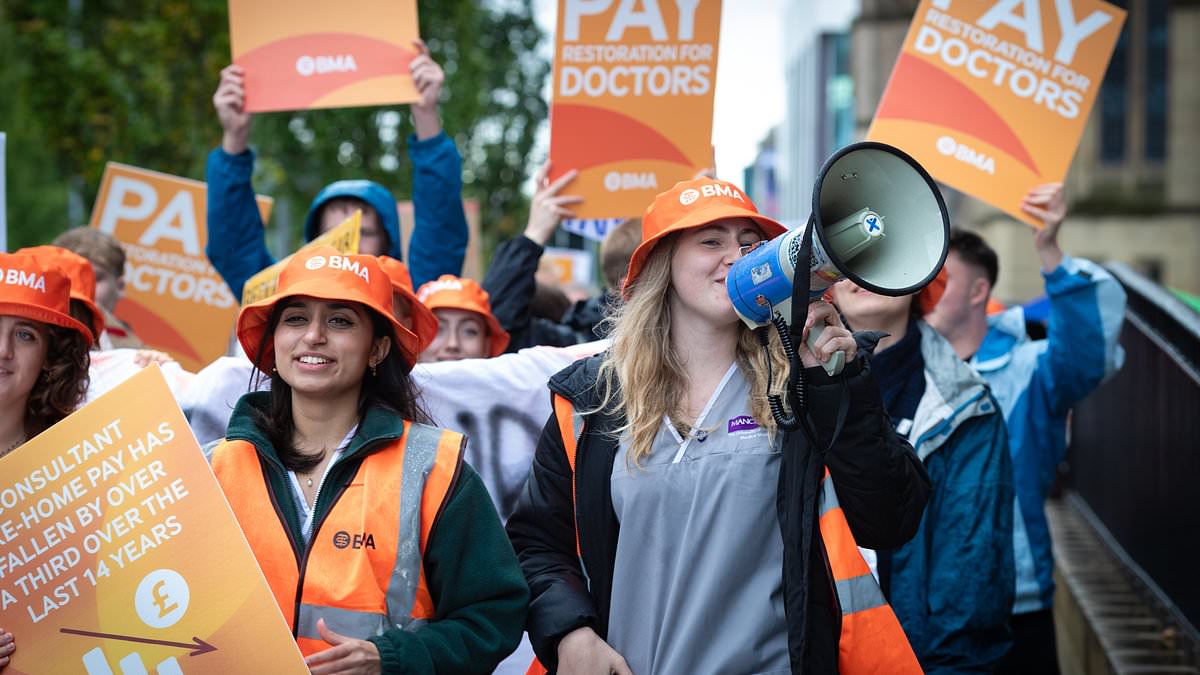NANA AKUA: I’d rather see a pay rise for frontline doctors than backseat politicians
Most of the time, workers can expect a pay rise only after they’ve done a good job. Members of Parliament appear to be an exception.
Despite another 12 months in Westminster replete with scandal, sleaze and outright incompetence, MPs are slated to receive an inflation-busting 7.1 per cent pay rise, taking their annual basic income to £92,731 from April next year.
Such largesse would be generous at the best of times, but with many families still struggling with the cost of living this winter, it’s frankly unforgivable.
Millions of workers are pushing for a pay rise merely in line with inflation — which dropped in November to 3.9 per cent — let alone a rise that ensures they’re better off in real terms.
And while I don’t agree with reckless public-sector strikes, I’d rather see a pay rise for frontline doctors than backseat politicians.
‘While I don’t agree with reckless public-sector strikes, I’d rather see a pay rise for frontline doctors than backseat politicians,’ Nana Akua writes
Junior doctors are set to stage the longest strike in NHS history
MPs are slated to receive an inflation-busting 7.1 per cent pay rise, taking their annual basic income to £92,731 from April next year
Junior doctor members of the British Medical Association (BMA) during a rally outside Downing Street in London
The sad truth is that the public coffers are empty. Five years ago, the national debt stood at £1.7 trillion. Today, thanks to ludicrous spending during the pandemic, the figure is around £2.6 trillion. In other words, the country has been plunged into an unthinkable debt spiral.
This is our national debt — and the nation has to pay for it — through higher taxes and lower wages.
So it’s preposterous that these parliamentarians — largely responsible for getting us into this mess in the first place — will avoid the fiscal squeeze.
Supposedly, MPs don’t dictate their own remuneration. It’s set by the Independent Parliamentary Standards Authority (Ipsa), which regulates MPs’ pay, pensions and business costs.
But for too long now, MPs have used Ipsa’s alleged independence as a way to avoid accountability for their soaring wages. Now they should be brave enough to come out publicly and recommend that Ipsa freezes their pay.
And who works for Ipsa, this allegedly ‘independent’ body? The Chairman is Richard Lloyd OBE, a former ‘special adviser’ to Gordon Brown between 2007 and 2010.
Then there’s CEO Ian Todd, whose profile boasts of ‘time in central government, including the Department for Education and the Cabinet Office’.
The notion that Ipsa is truly independent seems laughable to me. As institutions go, Ipsa is about as establishment as they come.
Nana Akua writes: ‘Tt’s preposterous that these parliamentarians — largely responsible for getting us into this mess in the first place — will avoid the fiscal squeeze’
Richard Lloyd OBE (pictured), a former ‘special adviser’ to Gordon Brown between 2007 and 2010, is the chair of Ipsa
And let’s not forget, MPs’ basic income is just the start of their generous taxpayer-funded package. Currently, each member is entitled to £5,720 per dependent for ‘caring responsibilities’; £25,080 as a ‘London living allowance’ (£17,840 outside the capital); and a whopping £31,620 for ‘office costs’.
And then there’s expenses. While the 2009 expenses scandal — which exposed such ludicrous claims as a ‘duck house’ for Peter Viggers and garlic peelers for the millionaire lawyer James Arbuthnot — has largely stopped members from abusing the system outright, there remain some indefensible claims.
In July this year, for example, it emerged that Labour’s Shadow treasury minister Abena Oppong-Asare claimed a £55 parking fine as an ‘expense’.
A month earlier, another of Keir Starmer’s top team, Angela Rayner, infamously billed the taxpayer £139 for a new pair of Apple AirPod earphones.
According to Ms Rayner, the fashionable accessory was vital for carrying out her duties as an MP. Perhaps she could write Labour’s next manifesto while listening to old episodes of ‘I’m Sorry I Haven’t a Clue’.
And don’t forget, even more bizarrely, MPs are supposedly so under-occupied that they are free to bolster their finances with second jobs. Over the past year, members raked in an astonishing £10 million from extra work, equivalent to over £15,000 each.
When you add it all up, MPs are some of the best-paid people in the country, but they’re certainly not among the highest performers.
The UK’s average salary is roughly £33,000 a year. Accepting a new salary of anywhere near the mooted £92,731 during a cost-of-living crisis would only prove that MPs act with impunity and treat the taxpayer with contempt. The rise would put MPs in the top 3 per cent of UK earners.
In the real world, pay is linked to performance. Work hard and get on — that’s how I was brought up. And that’s why I believe MPs should be paid in line with the country’s economic performance.
If the country does well, they should benefit. But if they run the national debt up to record levels, then they should pay for that, too.
It’s an honour to be elected an MP. These molly-coddled members need to start treating their office with respect and remember that it’s the taxpayer who put them there, and the taxpayer who can kick them out.
Source: Read Full Article






